Lectures on the Early History of Institutions

cumstances it is not wonderful that the Brehon law, growing together without legislation upon an original body of Aryan custom, and formed beyond the limit of that cloud of Roman juridical ideas which for many centuries overspread the whole Continent, and even at its extremity extended to England, should present some very strong analogies to another set of derivative Aryan usages, the Hindoo law, which was similarly developed. The curious and perplexing problems which such a mode of growth suggests have to grappled with by the student of either system.
The ancient laws of Ireland have come down to us as an assemblage of law-tracts, each treating of some one subject or of a group of subjects. The volumes officially translated and published contain the two largest of these tracts, the Senchus Mor, or Great Book of the Ancient Law, and the Book of Aicill. While the comparison of the Senchus Mor and of the Book of Aicill with other extant bodies of archaic rules leaves no doubt of the great antiquity of mu
Previous Constitution of Japan [1889]

executed.
Article 7. The Emperor convokes the Imperial Diet, opens, closes, and prorogues it, and dissolves the House of Representatives.
Article 8. The Emperor, in consequence of an urgent necessity to maintain public safety or to avert public calamities, issues, when the Imperial Diet is not sitting, Imperial ordinances in the place of law.
(2) Such Imperial Ordinances are to be laid before the Imperial Diet at its next session, and when the Diet does not approve the said Ordinances, the Government shall declare them to be invalid for the future.
Article 9. The Emperor issues or causes to be issued, the Ordinances necessary for the carrying out of the laws, or for the maintenance of the public peace and order, and for the promotion of the welfare of the subjects. But no Ordinance shall in any way alter any of the existing laws.
Article 10. The Emperor determines the organization of the different branches of the administration, and salaries of all civil and military office
Spalding’s Baseball Guide and Official League Book for 1889

F 1888.
The season of 1888, in the professional arena, was marked by several events which placed it on record as the most noteworthy, known in the thirteen years’ history of the National League. In the first place it was the inaugural year of the grand movement made by the President of the Chicago Club, to extend the popularity of our national game beyond the American continent; an event which exhibited the characteristic energy, pluck, liberality and business enterprise of Mr. Spalding, in a very marked manner; the grand success which the venture met with being a well merited reward for the large financial outlay which he incurred in the experiment. Secondly, the struggle for the championship of the League, resulting as it did in the success of the New York club, gave to the East a lead in the pennant races which they had not held since 1884, when the Providence club won the championship, Chicago having held the honors in 1885 and 1886, and Detroit in 1887. The past season, too, excelled all previous
The Uses of Italic
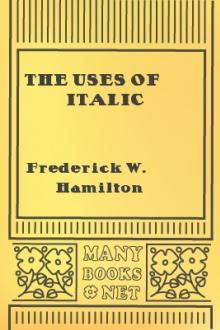
2;+2 ab + b² ; the line a c = the line a b ; the n th power; at the point B .
XIV. Italicize particular letters of the alphabet when referred to as such.
We use a much more frequently than q .
XV. Authorities in science differ in the use of italics and capitals. In strictly scientific matter it is better to follow copy if the copy is intelligently prepared; if not, follow some recognized text-book on the subject.
In general the following rules will be found serviceable.
(a) In botanical, zoological, geological, and paleontological matter, italicize scientific (Latin) names of genera and species when used together (the generic name being in the nominative singular), and of the genera only, when used alone. When genera and species are used together the genus always comes first, species second.
Agaricus Campestris , Felis leo , Conodectes favosus , Phyteuma Halleri ,
Sinks of London Laid Open
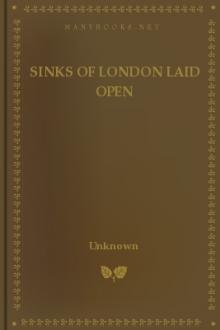
n, who live luxuriously on the tales of others, and the real claimant of charity, whose honest shame will hardly allow him to beg for sufficient to procure the hard comforts of a bed of straw; the match seller and ballad-singer, whose convenient profession unite the four lucrative callings of begging, selling, singing, and stealing; gangs of shipwrecked sailors, or rather, fellows whose iron constitutions enable them for the sake of sympathy, to endure the most inclement weather, in almost a state of nudity, and among them only one perhaps ever heard the roar of the ocean; jugglers, coiners, tramps (mechanics seeking work), strolling players, with all the hangers-on of fairs, races, assizes, stable-yards; besides the hosts of Irish who yearly migrate from sweet Erin to happy England, to beg, labour, and steal. Here then, is a wide field for speculation, a vast common in life, where a character may be almost picked up at every step–mines of vice and misery as yet unexplored. A road that has never yet been tro
American Eloquence, an Index of the Four Volumes
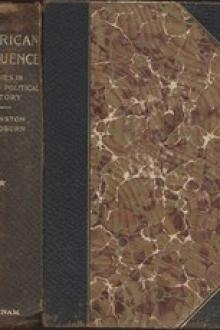
VOLUME I. — ETEXT #15391
PREFACE TO THE REVISED EDITION.
INTRODUCTORY.
I. — COLONIALISM.
JAMES OTIS
PATRICK HENRY
SAMUEL ADAMS
ALEXANDER HAMILTON
JAMES MADISON,
II. — CONSTITUTIONAL GOVERNMENT.
ALBERT GALLATIN,
FISHER AMES,
JOHN NICHOLAS
III. — THE RISE OF DEMOCRACY.
THOMAS JEFFERSON,
JOHN RANDOLPH,
ADMISSION OF LOUISIANA.
JOSIAH QUINCY,
HENRY CLAY
IV. — THE RISE OF NATIONALITY.
ROBERT Y. HAYNE,
DANIEL WEBSTER,
JOHN C. CALHOUN
THOMAS H. BENTON,
List of Illustrations
Patrick Henry
The Iroquois Book of Rites
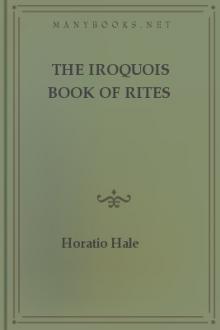
he precise incident, thus frankly admitted to be of a miraculous
character, really took place, we are not required to believe. But that
emigrants of the Huron-Iroquois stock penetrated southward along the
Allegheny range, and that some of them remained near the river of that
name, is undoubted fact. Those who thus remained were known by various
names, mostly derived from one root–Andastes, Andastogues, Conestogas,
and the like–and bore a somewhat memorable part in Iroquois and
Pennsylvanian history. Those who continued their course beyond the river
found no place sufficiently inviting to arrest their march until they
arrived at the fertile vales which spread, intersected by many lucid
streams, between the Roanoke and the Neuse rivers. Here they fixed their
abode, and became the ancestors of the powerful Tuscarora nation. In the
early part of the eighteenth century, just before its disastrous war
with the colonies, this nation, according to the Carolina surveyor,
Lawson, numbered fifteen towns, and could set
The Future of the Colored Race in America
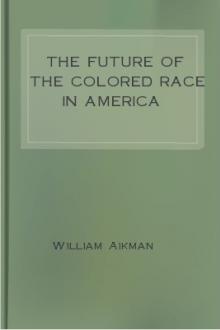
n. There are, with very rare exceptions throughout the whole South, but two classes–free and slave, or we may say, slave-holders and slaves, for the non slave-holders are completely lost and absorbed in the all-controlling element which is above them; they work in with it, and are indeed a part of it. As slavery called this aristocracy into being, and created its power, so it holds it in being; anything which strikes at slavery strikes at the root of this power; to destroy slavery would be to blot it out of existence.
Around this point the whole contest is waged, and from it alone every movement is to be interpreted. In the days of South Carolina nulification the tariff was indeed the pretext of rebellion, and the true motive was a separate government and the perpetuation of the power of the dominant class, but this power depended wholly upon the status of slavery, and so, back of all slavery was even then the thought, and to strengthen slavery the great end. In this we find the accurate explanation o
Dictionnaire historique universel

fondation du second empire par Artaxerxès, jusqu’au temps de la conquête de la Perse par les Arabes mahométans. 179
Perse, troisième époque, ou Perse moderne, depuis la fondation du nouvel empire par Ismaël Sophi jusqu’à nos jours. 181
Phéniciens. 162
Philistins. 167
Phrygiens. 174
Polonais. 124
Pont (Le). 184
Portugal. 85
Prussiens. 129
Rome (Italie, 2e époque). 33
Russes. 126
Sardaigne. Voy. Savoie . 185
Sarmates. 97
Savoie. 135
Saxe (Royaume de). Voy. Allemands , à la fin, page 89, et -Saxons-, à la fin. 109
Saxons. 109
Scythes. 191
Sicile. 45
Sicyone (Grèce, première époque). 3
Sparte. Voyez Lacédémone (Grèce, première époque). 8
Suédois. 117
Suèves. 108
Suisses. 133
Syriens. 160
Birch Bark Legends of Niagara
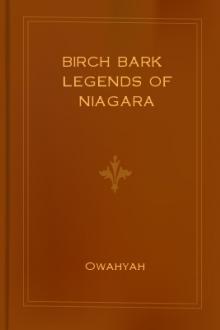
en? Let my children speak, their
father will listen.”
With the last words all excitement seemed to pass from him, and the face
of Great Oak assumed that immovable expression which rendered it so
impossible to surmise what really were his thoughts or wishes. The
murmuring wails of the women in remembrance of War-Eagle and the
threatening tomahawks that were shaken at the prisoners, all ceased as
slowly the first Chief again rose to speak.
“Let our brother, the young brave who followed where War Eagle led, and
returned with prisoners and trophies to appease his mourning people–let
the Black Snake speak, that we may know how to counsel our father.”
[Illustration: BLACK SNAKE.]
The eyes of the young warrior thus alluded to flashed with fierce
delight–his nostrils dilated with strong emotion. Passing with a
haughty stride in front of the Chiefs, displaying to all the bloody
trophies at his side, without dignity or feeling, but in an excited,
vindictive manner, he gave an exaggerated account of the fo

